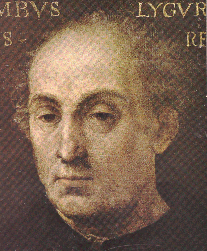Columbus, Part III
translated into prophetic destiny. Prophecy was the bridge
between cosmological theory and fifteenth century science and
God's plan for the world. The secret of the Sea of Darkness to
the Admiral had not been penetrated because God wanted it hidden
until He was ready. Columbus firmly believed that God had
selected him to uncover its mystery and to reveal new lands to
gain for Christ. [Columbus] believed
that God had given him a special spiritual intelligence to
understand the mysteries of prophetic Scripture relating to
unknown regions of the earth and then he set out to accumulate
the intellectual abilities necessary to achieve his mission.
Thus, faith and reason became wedded in his mind and created an
unshakable resolve to reach his goal.
-- Delno C. West
 Hero or Villain? Some may have viewed Columbus as a heroic proto-American whose major contribution was to put to shame backward critics who thought he would fall off a flat earth. But that's a historical illusion. On the other hand, we have seen Columbus come under severe assault recently. He and the culture he represented have been lambasted for initiating the modern cultural dominance of Europe and every subsequent world evil: colonialism, slavery, cultural imperialism, environmental damage, and religious bigotry. There is some truth to this, but the reality is more complex. To equate an individual or a culture with all the negative aspects of the emergence of an interconnected world is to do injustice to historical truth, and to insult Him who is the Author of Truth.
Hero or Villain? Some may have viewed Columbus as a heroic proto-American whose major contribution was to put to shame backward critics who thought he would fall off a flat earth. But that's a historical illusion. On the other hand, we have seen Columbus come under severe assault recently. He and the culture he represented have been lambasted for initiating the modern cultural dominance of Europe and every subsequent world evil: colonialism, slavery, cultural imperialism, environmental damage, and religious bigotry. There is some truth to this, but the reality is more complex. To equate an individual or a culture with all the negative aspects of the emergence of an interconnected world is to do injustice to historical truth, and to insult Him who is the Author of Truth.
As scholar Robert Royal puts it, "Whether the issue is natives carrying out human sacrifice, torture, cannibalism, and environmental damage in the past, or Indians poised (in age-old custom) to burn tropical rain forests in the present, the tendency is to paint European sins all the blacker by whitewashing their native counterparts. Native spokesmen and their advocates . . . have a point, but fail at the morally important responsibility of identifying not only Europe's sins, but those aspects of Native cultures that have been changed for the better by the encounter with Europe."
Next time: The First Explorers; They Weren't Sensitive Ethnologists by Any Measure...

0 Comments:
Post a Comment
<< Home